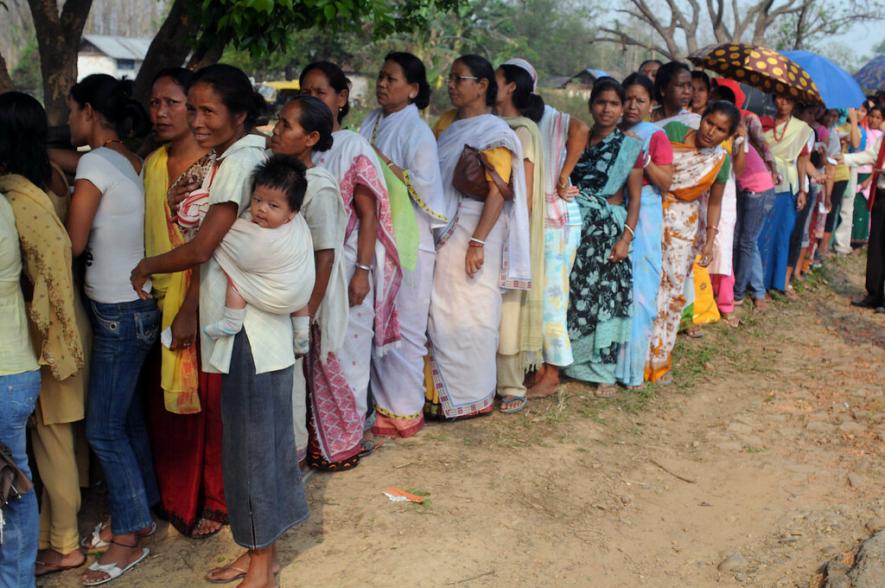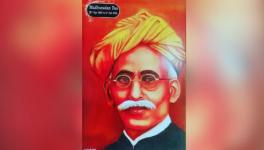Nagaland Election: Christian Forum Appeals for Voting With Conscience

The female Voters are waiting for their turn to cast the vote at a polling station in Vamen Vukhri Tree, Dimapur, Nagaland during the first phase of the General Election-2009 on April 16, 2009. Image Courtesy: Flickr
Kolkata: A recent appeal to “vote with good conscience” made by Northeast Christian leaders, including those of the Nagaland Joint Christian Forum, is the highlight of the February 27 Nagaland Assembly election campaigns. Every political party is campaigning with an assurance of improving the lives of voters.
The appeal was made following a session of Northeast Christian leaders in Guwahati on February 17 where they reminded voters, with 9 out of 10 Christians, how Christianity has been “viciously targeted” in recent years through hate speeches, humiliation and violence.
The Christian leaders asked voters to recall how Australian missionary Graham Staines and his sons Philip (10) and Timothy (6) were murdered on January 22, 1999, in the nondescript tribal village of Manoharpur, in Odisha’s Keonjhar district.
Voters were also reminded about how Christians in Odisha’s Kandhamal district were “ruthlessly targeted by vested interests” from August 25 to 28, 2008, after VHP leader Swami Lakshmanananda was shot dead on August 23. People were killed, churches destroyed and educational institutions damaged during the riots that followed.
The Christian leaders vented their fears about the demand of “the RSS-backed organisation” Janajati Dharma Sanskriti Surakhsha Mancha for delisting Christian tribals from the ST list. While authorities have denied any such intention, “churches are being harassed with undue inquiries, uncalled for requirements and warnings”, according Shillong-based Khasi Jaintia Christian Leaders Forum’s general secretary EH Kharkongor, who has gone record about the deliberations at the February 17 meeting.
“Given the ground reality, voters should not succumb to false promises and allurements. They should judiciously make use of their electoral privilege and elect able, trustworthy leaders committed to the good of the community and nation,” Kharkongor said.
The leaders also appealed to voters of Meghalaya, which has 75% Christian population and goes to the polls on the same day as Nagaland.
On February 19, several Christian organisations led by the United Christian Forum protested at Jantar Mantar, New Delhi, against rising attacks on the community and drew the attention of the government, judiciary and civil society to such incidents. They also decided to submit a memorandum to President Droupadi Murmu requesting setting up of a national redressal commission headed by a retired Supreme Court Judge.
The Eastern Nagaland People’s Organisation (ENPO) has been demanding a separate state called Frontier Nagaland comprising the six extremely backward districts in the east—Kiphire, Longleng, Mon, Noklak, Shamator and Tuensang.
The ENPO is the umbrella body of seven tribes of eastern Nagaland: Chang, Khiamniungan, Konyak, Phom, Santam, Tikhir and Yimkhiung.
The six districts have 20 of Nagaland’s 60 Assembly constituencies. The ENPO had initially threatened to boycott the election though MLAs from the region were in favour of voting. The ENPO leadership finally agreed to participate after Union home minister Amit Shah’s assured them of looking into the matter seriously following the polls.
According to sources, creation of a Frontier Nagaland is difficult because four of the six districts— Mon, Noklak, Kiphire and Phek—have borders with Myanmar, where the situation is not normal due to the military junta’s rule. In fact, Mon’s Longwa village is right on the Myanmar border. Though the idea of an autonomous arrangement, as admissible under the Constitution, has been discussed.
There is also lack of clarity among the BJP top brass. During a recent campaign, BJP president JP Nadda mentioned considering a special packaged-linked development board for holistic growth of the region after post-election. But Shah has avoided being specific both in terms of an institutional framework and a timeframe. He, of course, offered to revisit AFSPA.
In 2012, then-BJP president Nitin Gadkari had promised to fulfil the demand for Frontier Nagaland if the assumed power at the Centre in 2014.
The peace process with extremist groups, often referred to as “Indo-Naga political issue”, remained a sensitive matter in elections since 2003. There were some positive movements between 2015 and 2017.
In August 2015, the government signed the Framework Agreement with the National Socialist Council of Nagalim-Isak Muivah. In November 2017, the Centre signed the Agreed Position (a sort of preamble accord) with the Naga National Political Groups, a federation of seven organisations that joined talks for ending insurgency. But the demand for a separate Naga flag and a Constitution has remained the main roadblock with the Centre being firm on not fulfilling it. A Naga flag may be allowed only for their cultural activity.
More than 13 lakh voters out of Nagaland’s population of 19.79 lakh will vote on February 27. In all, 184 candidates are contesting the election.
The ruling alliance of BJP and chief minister Neiphiu Rio’s Nationalist Democratic Progressive Party (NDPP) is sticking to the 2018 seat sharing formula of 20:40. The Naga People’s Front will contest on its own and has put up 22 candidates while the Congress has fielded candidates on 23 seats. The BJP’s Akuluto candidate Kazheto Kinimi was re-elected unopposed after the only opponent Congress’s Khekashe Sumi withdrew his candidature.
The writer is a Kolkata-based senior freelance journalist. Views are personal.
Get the latest reports & analysis with people's perspective on Protests, movements & deep analytical videos, discussions of the current affairs in your Telegram app. Subscribe to NewsClick's Telegram channel & get Real-Time updates on stories, as they get published on our website.























